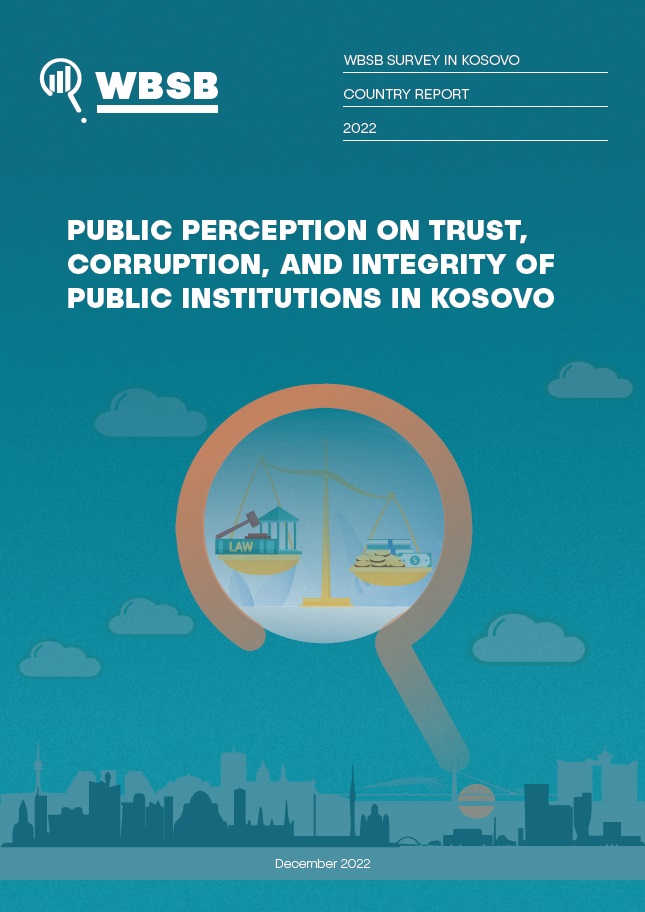21/12/2022

Kosovar Centre for Security Studies (KCSS)
National Endowment for Democracy (NED)
Plator Avdiu
Security institutions in Kosovo are constantly maintaining, and in some cases, increasing their trust among the citizens, thus resulting as the most trustworthy institutions compared to other sectors. Kosovo Security Force is the most trusted institution with 83 percent of trust, followed by Emergency Management Agency with 73 percent, and Kosovo Police, which is trusted by 72 percent of respondents. Two other security institutions have marked significant increase in 2022: around 60 percent of respondents trust the Police Inspectorate of Kosovo and 51 percent trust the Kosovo Intelligence Agency. This is the first time that both institutions gained the confidence of more than 50 percent. The President of Kosovo, with 59 percent, and Municipalities, with 55 percent of trust, are ranked as the most trusted among the central and local institutions followed by Kosovo Customs with 46 percent.
On the contrary, the trend of trust towards justice sector institutions – Courts and Prosecution – is rather negative and remained unchanged compared to previous years. In 2022, only 30 percent of citizens declared their trust in such institutions. The least trusted institution from the list of state institutions is the Kosovo Assembly with 25 percent, followed by the Kosovo Government with 33 percent of trust. Both these central institutions have marked decrease in trust in 2022 when compared to 2021. In terms of Kosovo’s non-state institutions, the most trusted are religious communities with 60 percent, and non-governmental organizations with 40 percent of trust. However, it is worrying that media and political parties have the most negative perceptions by respondents – around 23 percent of respondents trust media and only 12 percent political parties – proving to be the least trusted institutions in 2022.
The national security of Kosovo is significantly challenged by organized crime and corruption in the eyes of respondents. 82 percent mentioned organized crime and 80 percent mentioned corruption as two phenomena threatening national security and eroding the rule of law in Kosovo. In addition, respondents were not satisfied with either the Kosovo Government’s performance in fighting corruption or organized crime, while only 30 percent rated the latter as good. However, there is positive feedback in regard to reporting corruption cases, as 2/3 of respondents – around 66 percent – would report to the respective institutions if they were to witness corruption.
Integrity practices in public administration in Kosovo are exceptionally harmed based on respondents’ perceptions when it comes to employment in the public sector. There is a high degree of skepticism expressed as 86 percent of respondents think that civil servants in public administration are employed based on nepotism (family ties), political ties and bribery or corruption, opposed to only 11 percent perceiving they are employed on skills and merit-based systems. Respondents tent to be less pessimistic about recruitment processes in the security sector when compared to the public administration, yet challenges remain. Around 42 percent shared perceptions that employees of security institutions are most frequently employed based on the merit and skills of applicants, while around 54 percent of respondents perceive they are employed through nepotism, political ties and bribery or corruption.
The survey data for this report was collected within the framework of Western Balkans Security Barometer (WBSB) survey through face-to-face interviews with randomly selected respondents throughout Kosovo. The WBSB is a regional project led by Kosovar Centre for Security Studies (KCSS) and the survey was simultaneously conducted in Albania and Serbia. KCSS is partnering with the Centre for the Study of Democracy and Governance (CSDG) in Albania and the Belgrade Centre for Security Policy (BCSP) in Serbia to implement this project.
Field research was conducted from 25th of September to 2nd of October 2022. The questionnaire for the survey primarily consisted of closed-ended questions in the form of five-point Likert Scale, followed by several open-ended questions without pre-defined options. The national sample for the survey featured 1,136 households.
The data presented in the report derive from the Western Balkans Security Barometer (WBSB) survey. WBSB is a new regional initiative launched by KCSS in 2020, implemented in cooperation with the Belgrade Centre for Security Policy (BCSP) in Serbia and Center for the Study of Democracy and Governance (CSDG) in Albania, supported by the National Endowment for Democracy (NED). WBSB serves as an instrument to measure public perceptions in Albania, Kosovo and Serbia on different security-related issues. The findings demonstrate how citizens percept or are informed about the issues presented in this report. As such, the views presented in this report do not necessarily represent the views of the KCSS, BCSP, CSDG or NED.